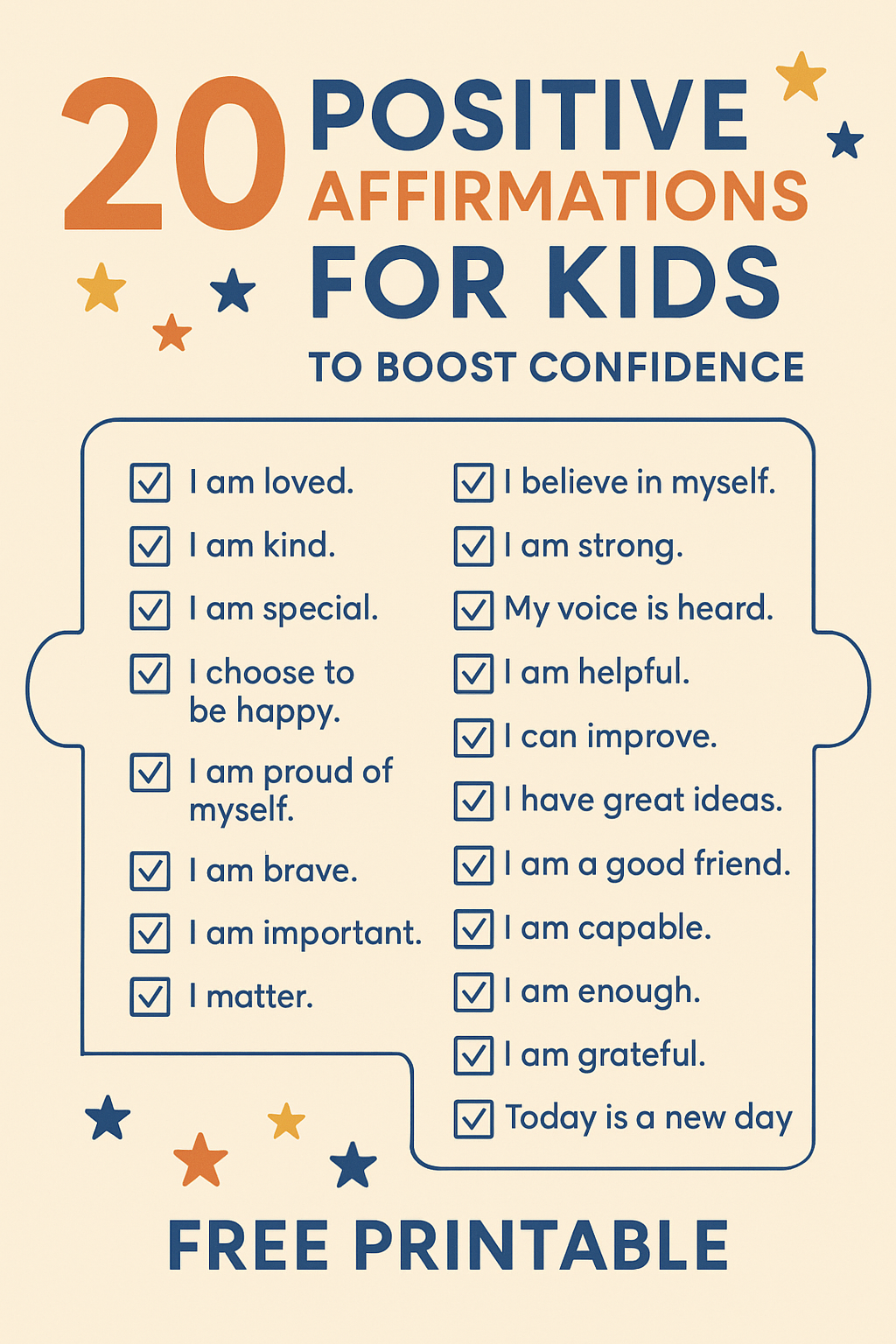130 Powerful Positive Affirmations for Kids to Build Confidence and Happiness
Positive affirmations for kids are powerful tools that can shape your child’s confidence, resilience, and happiness. In a world filled with challenges, our words can uplift their spirits and empower them to believe in themselves.
In a world where negativity often surrounds us, it’s crucial to fill our children’s lives with positivity and encouragement. One of the most effective ways to do this is through words of affirmation.
Affirmations are statements that uplift, encourage, and validate. They can boost confidence, strengthen relationships, and foster a positive self-image.
When my oldest child started struggling with self-confidence in school, I realized how powerful my words could be. Every morning, we began using simple positive affirmations together before heading out the door. Over time, I watched my child’s mindset shift from doubt to determination — and it reminded me just how important daily encouragement really is.
Incorporating affirmations into your daily interactions with your children can have a profound impact on their emotional well-being and development.
Heads up: This post may include affiliate links. As an Amazon Associate, I earn from qualifying purchases—at no extra cost to you. Full privacy policy and disclosure here.

Here are powerful words of affirmation that you can use to empower your children:
Positive Affirmations for Kids’ Self-Esteem
- You are enough.
- You are loved.
- You are valuable.
- You are important.
- You are capable.
- You are unique.
- You are special.
- You are worthy.
- You are brave.
- You are smart.
- You are talented.
- You are creative.
- You are resilient.
- You are kind.
- You are helpful.
- You are thoughtful.
- You are responsible.
- You are honest.
- You are trustworthy.
- You are a good friend.
- You make a difference.
- You are a problem solver.
- You are a good listener.
- You are curious.
- You are independent.
- You are adaptable.
- You are patient.
- You are compassionate.
- You are empathetic.
- You are forgiving.
- You are optimistic.
- You are a leader.
- You are resourceful.
- You are respectful.
- You are loved for who you are.
Positive Affirmations for Kids’ Success
- You can do anything you set your mind to.
- You have the power to achieve your dreams.
- You are making progress every day.
- You learn from your mistakes.
- Challenges help you grow.
- You are strong enough to face anything.
- You believe in yourself.
- You are getting better every day.
- You have great ideas.
- You are a hard worker.
- You are disciplined.
- You are focused.
- You are determined.
- You are persistent.
- You are patient with yourself.
Using positive affirmations with my kids has been a simple but powerful way to boost their confidence. Just a few encouraging words each day have made a huge difference in how they face challenges.
Positive Affirmations for Kids’ Kindness
- You have a kind heart.
- You treat others with respect.
- You are a good friend.
- Your kindness makes a difference.
- You are generous.
- You have a caring spirit.
- You are understanding.
- You make people feel valued.
- You are thoughtful of others’ feelings.
- You spread happiness wherever you go.

Positive Affirmations for Kids’ Resilience:
- You bounce back from tough situations.
- You face challenges with courage.
- You don’t give up easily.
- You find solutions to problems.
- You handle change well.
- You are flexible.
- You keep going even when it’s hard.
- You believe in your ability to overcome obstacles.
- You grow stronger through challenges.
- You are not defined by setbacks.
Positive Affirmations for Kids’ Gratitude:
- You appreciate the little things in life.
- You are thankful for what you have.
- You see the beauty in the world around you.
- You express gratitude every day.
- You are blessed.
- You recognize the good in others.
- You are grateful for the love in your life.
- You count your blessings.
Affirmations for Confidence:
- You stand tall and proud.
- You believe in your abilities.
- You are confident in who you are.
- You trust yourself to make the right decisions.
- You are comfortable being yourself.
- You speak up for yourself.
- You are not afraid to try new things.
- You embrace challenges with confidence.
- You know that you are capable of great things.
- You have faith in your future.
Positive Affirmations for Kids’ Belonging:
- You are a valued member of our family.
- You belong here.
- You are loved unconditionally.
- You are accepted for who you are.
- You have a place where you are wanted.
- You are part of something special.
- You are surrounded by people who care about you.
- You are never alone.
Positive Affirmations for Kids’ Emotions:
- It’s okay to feel sad sometimes.
- You are allowed to express your emotions.
- Your feelings are important.
- You are strong, even when you feel weak.
- You can talk to me about anything.
- You are understood.
- You are not alone in your feelings.
- Your emotions matter.
Positive Affirmations for Kids’ Empowerment:
- You have a voice that deserves to be heard.
- You can change the world.
- You have the power to make a difference.
- You are a leader of tomorrow.
- Your ideas are valuable.
- You can create positive change.
- You inspire others.
- You have limitless potential.
- You are the author of your own story.
Positive Affirmations for Kids’ Love:
- You are cherished.
- You are adored.
- You are treasured.
- You are deeply loved.
- You are surrounded by love.
- You are a blessing in my life.
- You are my greatest joy.

Positive Affirmations for Kids’ Encouragement:
- Keep going, you’re doing great.
- I believe in you.
- You’ve got this!
- You’re on the right track.
- Don’t be afraid to shine.
- I’m proud of you.
- You are capable of amazing things.
- Believe in yourself like I believe in you.
- You are unstoppable.
- You make me smile.
Positive Affirmations for Kids’ Connection:
- I love spending time with you.
- You brighten my day.
- You are a blessing in my life.
- I enjoy talking to you.
- You make my heart happy.
- You are my favorite person.
- I love you to the moon and back.
- You make our family complete.
- You are the best part of my day.
- You are loved more than you know.
Affirmations for Fun and Play:
- You have a wonderful imagination.
- You know how to have fun.
- You bring joy wherever you go.
- Your laughter is contagious.
- You make everyday moments special.
- You find happiness in the little things.
- You are full of energy and enthusiasm.
- You make life an adventure.
- You are fun to be around.
- Let’s make memories together.
FAQ
What are positive affirmations for kids?
Positive affirmations are short, encouraging statements that help kids build confidence, resilience, and a positive mindset about themselves and the world.
How often should I say affirmations to my child?
You can say affirmations daily, especially in the morning and before bed, or whenever your child needs a boost of confidence or encouragement.
What age should you start affirmations?
You can start using affirmations with kids as young as toddlers! Even if they don’t fully understand, the positive emotional connection forms early.
Can affirmations help with anxiety?
Yes! Repeating positive affirmations can calm anxiety by redirecting focus away from fears toward empowering beliefs.
Should I create custom affirmations for my child?
Absolutely. Personalized affirmations based on your child’s strengths and dreams are even more impactful.
✨ Download our free Positive Affirmations for Kids printable and start spreading powerful, encouraging words at home!
Bottom Line
Every child deserves to hear words of affirmation regularly. These positive messages can plant seeds of confidence, kindness, and resilience that will bloom throughout their lives.
Incorporate these affirmations into your daily routine, speak them with sincerity and love, and watch as they nurture your child’s spirit and strengthen your bond.
Remember, the impact of your words lasts a lifetime. Choose them wisely and let them be a beacon of light in your child’s journey of self-discovery and growth.

